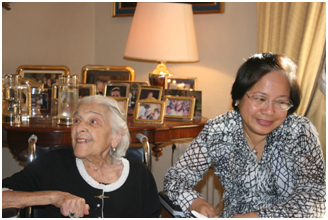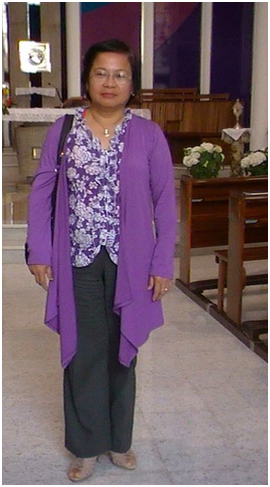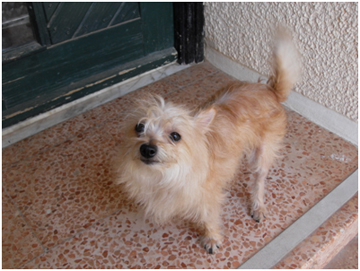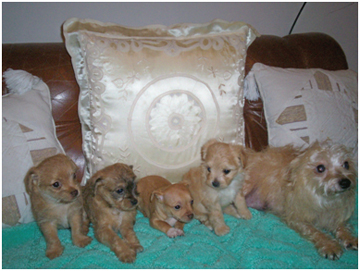Troubled Times In Libya, A Journey Of Faith
By Veronica Ugates
 The news of civil unrest in Tunisia and Egypt had but started to impinge on our consciousness. My husband and I decided to stock up on rice, supplied mainly by Egypt, as we were sure the price would go up. We bought five sacks, 125 kilos. As a further precaution we bought about 20 dressed chickens, meat and canned goods. The freezer and kitchen shelves were full and we went on with our normal life.
The news of civil unrest in Tunisia and Egypt had but started to impinge on our consciousness. My husband and I decided to stock up on rice, supplied mainly by Egypt, as we were sure the price would go up. We bought five sacks, 125 kilos. As a further precaution we bought about 20 dressed chickens, meat and canned goods. The freezer and kitchen shelves were full and we went on with our normal life.
On 17 February the trouble in Libya started, first in Benghazi. We were apprehensive but hoped everything would be fine. Then classes were disrupted with parents taking their children out of school. Our daughter who worked in an international school reported until 27 February but no longer received her salary. Nobody was there to pay it.
I reported to work but office life had been disrupted as well with the workers in the oilfields returning to Tripoli, as brigands and bandits took the opportunity to loot the desert camps. The workers in Ghani Field were rescued by a British plane and flown directly to Malta, leaving their passports behind. I stayed until the end of February, as I became the conduit through whom some Filipinos got in touch with their companies in Tripoli and messages to those in the field were transmitted through me. Meanwhile at home we took precautions by strengthening the door jambs and sleeping in the living room so as to be ready at any time. We tried to go to church for Mass but found it full of evacuees and decided to stay and pray at home.
On 1 March the British lady I worked with decided to go home. I realized that I wouldn’t be an effective help to those I would like to extend assistance to as there wouldn’t be anybody to send any information to. So I decided to go on a ferry to Malta with my family. I also had a young daughter who needed to be protected.
 In Malta I continued to communicate with those still in Tripoli, trying to get them out. One dramatic rescue reminded me of a film, probably Raid on Entebbe, as the workers were ferried by oil tanker to Malta. When I met them they were so profuse with their thanks. As far as I was concerned it was part of my responsibilities to fellow workers in a similar predicament to my own. While in Malta we went to Mass in St Patrick’s in Sliema, run by the Salesians, and the Church of the Blessed Virgin in Rabat, run by the Dominicans.
In Malta I continued to communicate with those still in Tripoli, trying to get them out. One dramatic rescue reminded me of a film, probably Raid on Entebbe, as the workers were ferried by oil tanker to Malta. When I met them they were so profuse with their thanks. As far as I was concerned it was part of my responsibilities to fellow workers in a similar predicament to my own. While in Malta we went to Mass in St Patrick’s in Sliema, run by the Salesians, and the Church of the Blessed Virgin in Rabat, run by the Dominicans.
In one of our perambulations, we met a group of Filipinos. What drew me to them was that one of them was wearing clothes that looked full of bullet-holes. We had heard of a group who made their escape in a van that was peppered with bullets. This confirmed that story. They told us that about 16 of them, mostly Filipinos and one European, had left their devastated camp in a supply van. At the first military checkpoint they were asked to stop but the driver was so frightened he didn’t stop and so they were shot at with so many guns roaring but the driver just went as fast as he could. Inside the van they could hear the bullets thudding on the floor and didn’t know whether anyone was hit.
At the second checkpoint they were again asked to stop and the driver prudently did so. They were told to get out and sit in a circle in the sand. With so many AK-47s pointed at their backs they thought that this was the end. But the soldiers only removed the bullets on the floor of the van. It was then they discovered that one had been shot in the fleshy part of his arm and the European hit in the back. The bullet was resting against a rib and didn’t penetrate to do any damage. They arrived in Ras lanuf where the doctor attended to the wounded. This doctor wasn’t a devout man but having seen the van with bullet holes said he could hardly believe that only two were hit and very lightly at that. It was truly a miracle.
 We had been a week in Malta and I discovered that my salary wasn’t forthcoming. As the paying bank was in Germany it was unfortunately included in the European Union sanctions against Libya. The decision to go home had finally arrived, as it was clear that we couldn’t stay in Malta without jobs and without funds.
We had been a week in Malta and I discovered that my salary wasn’t forthcoming. As the paying bank was in Germany it was unfortunately included in the European Union sanctions against Libya. The decision to go home had finally arrived, as it was clear that we couldn’t stay in Malta without jobs and without funds.
It was a decision I wasn’t willing to take without a fight. As I informed the DFA officers, who were not amused, I was over-rage, over-qualified, over-experienced and over-paid, and nobody in their right mind would employ me. Besides I was paying a PHP25,000 debt monthly for which I had mortgaged a piece of our property or it would be foreclosed. They were adamant that I go home to the Philippines as there would be government assistance available for us, of which I was most sceptical and I was proved right. The repatriated people I am in contact with are now complaining of financial problems and getting nothing from the government except for the initial PHP10,000 which would last at most a month for food supplies.
So I prayed hard to the Divine Mercy, repeating the three o’clock prayer over and over again whenever I woke up and at any time of day or night when I remembered to do so.
It so happened that I have a friend in Malta whom I met in 2006, a Filipina married to a Maltese. She asked me to accompany her to see their lawyer as she was trying to get her niece to Malta. As the lawyer and I talked he mentioned that he had an elderly aunt who needed care at home. Immediately I jumped at the chance to stay. As I later found out, this lawyer was one of the few people who could make this arrangement for me since apparently international law is strict on this matter, as I was a refugee. He communicated with the Philippine embassy in Tripoli and got me the chance I was seeking. I could stay in Malta for three months.
 How can one assess the power of prayers? I have always known that God answers them as I have proved on many occasions, but not as dramatically. It was a cause of wonder for me. It still is.
How can one assess the power of prayers? I have always known that God answers them as I have proved on many occasions, but not as dramatically. It was a cause of wonder for me. It still is.
We also learned that our house in Libya where we had stayed for 24 years had been ransacked but this didn’t bother us as we felt that the decision to leave was the right one. After all, the possessions we had accumulated aren’t worth any suffering we may have to endure. I am only sad that I’d left my beautiful pet behind, a dog so intelligent and so loyal, she always defended me from any possibility of harm however imaginary.
Meanwhile my husband and daughter had gone home to the Philippines. My husband decided to start a business as we can never know when the trouble in Libya will be over. But the length of separation took its toll on us both. We were constantly in disagreement and he was upset.
Thankfully, communication is easy with the internet and after so many daily messages back and forth, and prayers for more understanding, we finally got to a greater understanding of our needs, our dreams and plans for the future and our relationship.
The war in Libya has taught me a number of things: first, that indeed God answers our prayers, second, that with God’s help we can be stronger as individuals, third, that separation can strengthen our relationship because He is there as our support, and fourth, we can turn disaster into something positive with His guidance.
